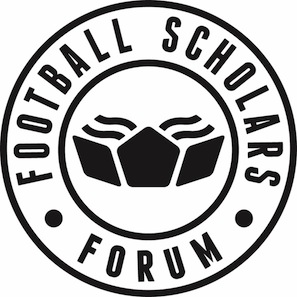 For almost a decade I’ve been involved with the Football Scholars Forum, an online book club that TV wordsmith Ray Hudson labeled “the soccer think tank.” An intellectual pick up game of sorts, an informal space to read, reflect, try new things, network, learn, and engage in thoughtful conversations with fútbologists around the world.
For almost a decade I’ve been involved with the Football Scholars Forum, an online book club that TV wordsmith Ray Hudson labeled “the soccer think tank.” An intellectual pick up game of sorts, an informal space to read, reflect, try new things, network, learn, and engage in thoughtful conversations with fútbologists around the world.
This fall, the group met three times. On September 25, Amy Bass, an historian and Emmy-award winning producer, joined us for a discussion of her new book, One Goal: A Coach, a Team, and the Game That Brought a Divided Town Together. This evocative ethnography of Somali immigrants playing for Lewiston (Maine) High School’s Blue Devils provides both a contemporary shapshot of a changing postindustrial northeastern town and a classic sports story, a-la Friday Night Lights. Written for a general audience, One Goal benefits greatly from Bass’s expertise as a scholar of sports and the politics of race in the United States. With xenophobia and intolerance rising nationally and internationally, this book restores some hope that soccer can play a meaningful role in building community.
Sebastian Abbot, a former correspondent for the AP in Pakistan, was our guest on October 17. His (first) book, The Away Game: The Epic Search for Soccer’s Next Superstars, chronicles the “largest talent search in sports history”—the Football Dreams/Aspire Academy organized and lavishly funded by Qatar, the 2022 World Cup host nation, as a “soft power” operation. While many books these days thinly analyze “global football,” The Away Game tangibly connects people in West Africa, the Persian Gulf and Europe in illuminating ways. Scouting, the book shows, is increasingly reliant on science and information technology (big data, AI, etc.), but the attributes that led to the success of Diawandou Diagne, one of Abbot’s subjects from Senegal, “were much harder to spot in a match or training session; his judgment, strength of character, self-discipline, and motivation. These attributes made him a great leader. They also helped him make smart decisions off the field that proved just as important as those on it.”
The third FSF convocation took place on December 13, when we welcomed our University of Michigan colleagues Stefan Szymanski and Silke-Maria Weineck, authors of It’s Football, Not Soccer (and Viceversa). Through text mining of print media, scrutiny of Reddit and similar Internet forums, as well as other sources, the book explores the historical usage of the terms “soccer” and “football” mainly in the United States and Britain. In doing so, it reveals a much more complicated story that commonly assumed. The authors conclude that in a world with American, Australian, Gaelic, and rugby football codes, “soccer is quite a good word; unlike football, it does not create ambiguity.” Whether “soccer” can overcome its recent association with Americanization remains to be seen. Will the 2026 World Cup be a tipping point?
The Football Scholars Forum resumes after the holiday break. The next sessions will feature Todd Cleveland’s Following the Ball: The Migration of African Soccer Players across the Portuguese Colonial Empire (in February) and Rachel Allison’s Kicking Center: Gender and the Selling of Women’s Professional Soccer (March/April).